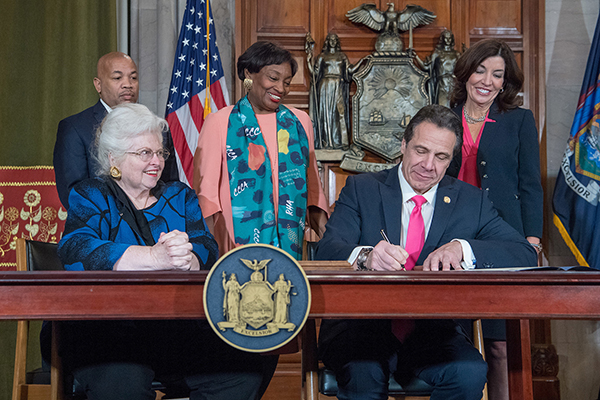The lives of our nation’s unborn children are now at an even greater risk since Jan. 22 when Gov. Andrew Cuomo signed into law New York’s new Reproductive Health Act.
State senator Liz Krueger, the bill’s enthusiastic sponsor, told the cheering New York crowds: “Today is just another of many very good days to come for democracy in the state of New York.”
Russell Moore, president of the Ethics & Religious Liberty Commission of the Southern Baptist Convention (SBC), asked: “Who could cheer the potential to stop the beating hearts of children who are in some cases — just weeks away from birth?”
The bill’s passage marks another sad chapter for Christians who value human life and who believe the psalmist’s words: “For you [God] created my inmost being; you knit me together in my mother’s womb … all the days ordained for me were written in your book before one of them came to be” (Ps. 139:13, 16).
Since the U.S. Supreme Court’s landmark decision in Roe v. Wade on Jan. 22, 1973, giving a woman legal right to an abortion, more than 60 million unborn children have been aborted. In just 46 years more unborn human beings have been destroyed than the total current population of Alabama, Georgia, Tennessee and five other southeastern states combined.
‘Right to life’
Some wonder if other states will follow New York’s example and also opt for more lenient abortion laws. Fortunately some states, like Alabama, are becoming stricter with abortion policies.
In fact Alabama was the first state in the nation to enshrine what opponents call a fetal “personhood clause” in its constitution, recognizing “the rights of unborn children, including the right to life.”
Almost 60 percent of Alabama voters supported this amendment.
Several years ago the Alabama Legislature further affirmed unborn human life when it passed a capital punishment update making it a death penalty offense to kill a pregnant woman because it meant two persons were killed.
“Person” is defined by Alabama law as “a human being, including an unborn child in utero at any stage of development, regardless of viability.”
In 2000, Alabama had 13 clinics that regularly provided surgical and medical abortions. Only three abortion clinics now remain in the state, located in Huntsville, Tuscaloosa and Montgomery.
How can Alabama Christians and churches address the increasing atrocity of abortion?
They can do many things, including voice an opinion; speak up for the rights of the unborn; support pro-life agencies, organizations and churches that minister to women and families; and pray.
Here are seven distinct ways to pray for the nation’s unborn children:
- Pray for the United States, its leaders and its lawmakers. Pray for the nation’s pro-life advocates as they continue their fight against cruel abortion laws. Pray that they may be heard and that their voices will reach the ears of the nation, helping to decrease the number of abortions.
- Pray for pro-life organizations, agencies and clinics that work with pregnant women, encouraging and helping them to bring unborn babies to term.
- Pray for Alabama’s churches to increase their efforts in ministries to unwed, teenaged, impoverished and other mothers who may be considering abortion.
- Pray for Alabama’s families to be strong, nurturing supporters to the young pregnant women in their care. Dr. Alveda King calls abortion “an attack on the family and the humanity that unites us all.”
- Pray that mothers who are tempted to end their unplanned pregnancies will consider adoption instead of abortion. Each year 9,000 women in Alabama face an unplanned pregnancy. Many have no emotional, medical or financial support to carry their babies to term.
- Pray for unborn babies, nestled in their mothers’ wombs, that they may be saved and granted the basic human rights of life.
- Pray for women who have chosen to undergo abortions in the past. Pray for their relationship with God, His forgiveness and their future peace.
_____________________________________________________________________________
NY’s new abortion law
New York’s recently passed Reproductive Health Act (RHA):
- Allows abortions to take place after the previous 24-week limit if the baby will not survive the birth or if necessary to protect the mother’s life or health. Mother’s “health” is not defined.
- Decriminalizes abortion by regulating it under the public health law, not penal law.
- Expands who can perform the abortion procedure from beyond just physicians to any licensed, certified or authorized health care practitioner.
For information on pro-life efforts in your community, visit www.chooselifealabama.org.






Share with others: